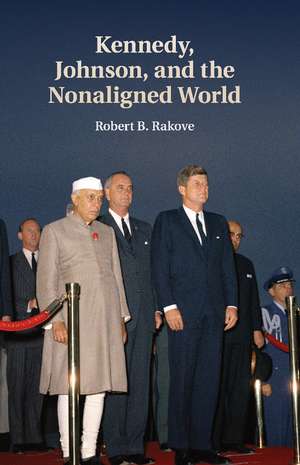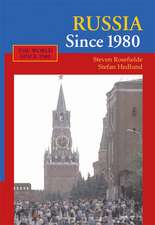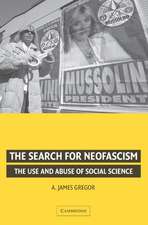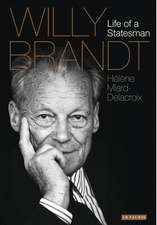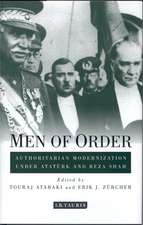Kennedy, Johnson, and the Nonaligned World
Autor Robert B. Rakoveen Limba Engleză Paperback – 28 mai 2014
| Toate formatele și edițiile | Preț | Express |
|---|---|---|
| Paperback (1) | 333.48 lei 6-8 săpt. | |
| Cambridge University Press – 28 mai 2014 | 333.48 lei 6-8 săpt. | |
| Hardback (1) | 695.06 lei 6-8 săpt. | |
| Cambridge University Press – 7 oct 2012 | 695.06 lei 6-8 săpt. |
Preț: 333.48 lei
Nou
Puncte Express: 500
Preț estimativ în valută:
63.83€ • 69.36$ • 53.65£
63.83€ • 69.36$ • 53.65£
Carte tipărită la comandă
Livrare economică 21 aprilie-05 mai
Preluare comenzi: 021 569.72.76
Specificații
ISBN-13: 9781107449381
ISBN-10: 1107449383
Pagini: 320
Ilustrații: 6 maps
Dimensiuni: 156 x 234 x 18 mm
Greutate: 0.49 kg
Editura: Cambridge University Press
Colecția Cambridge University Press
Locul publicării:New York, United States
ISBN-10: 1107449383
Pagini: 320
Ilustrații: 6 maps
Dimensiuni: 156 x 234 x 18 mm
Greutate: 0.49 kg
Editura: Cambridge University Press
Colecția Cambridge University Press
Locul publicării:New York, United States
Cuprins
1. 'Walking a tightrope': Eisenhower and nonalignment; 2. Rationales for engagement: the new frontiersmen approach nonalignment; 3. Conferences amid crises: the United States and nonalignment, 1961–2; 4. 'Getting the worst of both worlds': the United States and colonial conflicts; 5. The 'diffusion of power' and the spread of regional conflicts; 6. 'Our most difficult political battle': the question of aid; 7. 'A heavy burden for us to bear': the era of Vietnam; Conclusion: 8. 'A decent respect for the opinions of mankind'.
Recenzii
'Historians of the Cold War have long criticized US leaders for unsophisticated and heavy-handed policies toward the Third World. Robert Rakove convincingly challenges this view, demonstrating that for a few years in the early 1960s, US decision makers embraced a remarkably nuanced, tolerant approach to India, Egypt, and other 'nonaligned' nations. The book fundamentally alters our understanding of John F. Kennedy and underscores the tragedy that occurred when subsequent presidents abandoned his approach. Anyone interested in the Cold War and the roots of present-day tensions between the United States and the developing world will gain much from this elegantly crafted, deeply researched study.' Mark Atwood Lawrence, University of Texas, Austin
'In recent years, the tangled course of the Cold War in the Third World has inspired a vigorous scholarly debate. This outstanding monograph, which examines the ultimately unsuccessful US efforts to gain the support and sympathy of the nonaligned nations, makes an essential contribution to that debate. Based on deep, multinational research, Robert Rakove's authoritative study gives us the fullest and most sophisticated study yet of the uneasy encounter between the United States and the nonaligned movement during a crucial decade.' Robert J. McMahon, Ralph D. Merson Professor, Ohio State University
'The nonaligned movement was one of the most important developments of the Cold War, and yet, as Robert Rakove notes in this stimulating and fascinating book, historians have paid it very little attention. By examining the Kennedy and Johnson administrations' approach to the nonaligned movement, Rakove helps fill a large gap in the existing literature.' Andrew Preston, University of Cambridge
'The best overview of US policy toward the Third World in the 1960[s] in existence - a true feat of scholarship and synthesis.' O. A. Westad, author of Restless Empire: China and the World since 1750
'Robert Rakove has given us a precise and nuanced contribution to our understanding of how US foreign relations and the Cold War unfolded across Asia and Africa in the volatile and significant 1960s. All readers interested in the American relationship with the nonaligned movement will begin with this book.' Thomas ('Tim') Borstelmann, The American Historical Review
'… makes a solid argument about the differences between Kennedy and Johnson and their approaches to foreign policy … Rakove's book is exemplary and provides great insight … It will continue to provide a wealth of knowledge to scholars for years to come.' Philip A. Goduti, Jr, Journal of Cold War Studies
'In recent years, the tangled course of the Cold War in the Third World has inspired a vigorous scholarly debate. This outstanding monograph, which examines the ultimately unsuccessful US efforts to gain the support and sympathy of the nonaligned nations, makes an essential contribution to that debate. Based on deep, multinational research, Robert Rakove's authoritative study gives us the fullest and most sophisticated study yet of the uneasy encounter between the United States and the nonaligned movement during a crucial decade.' Robert J. McMahon, Ralph D. Merson Professor, Ohio State University
'The nonaligned movement was one of the most important developments of the Cold War, and yet, as Robert Rakove notes in this stimulating and fascinating book, historians have paid it very little attention. By examining the Kennedy and Johnson administrations' approach to the nonaligned movement, Rakove helps fill a large gap in the existing literature.' Andrew Preston, University of Cambridge
'The best overview of US policy toward the Third World in the 1960[s] in existence - a true feat of scholarship and synthesis.' O. A. Westad, author of Restless Empire: China and the World since 1750
'Robert Rakove has given us a precise and nuanced contribution to our understanding of how US foreign relations and the Cold War unfolded across Asia and Africa in the volatile and significant 1960s. All readers interested in the American relationship with the nonaligned movement will begin with this book.' Thomas ('Tim') Borstelmann, The American Historical Review
'… makes a solid argument about the differences between Kennedy and Johnson and their approaches to foreign policy … Rakove's book is exemplary and provides great insight … It will continue to provide a wealth of knowledge to scholars for years to come.' Philip A. Goduti, Jr, Journal of Cold War Studies
Notă biografică
Descriere
This book examines John F. Kennedy's policy of engaging states that had chosen to remain nonaligned in the Cold War.
